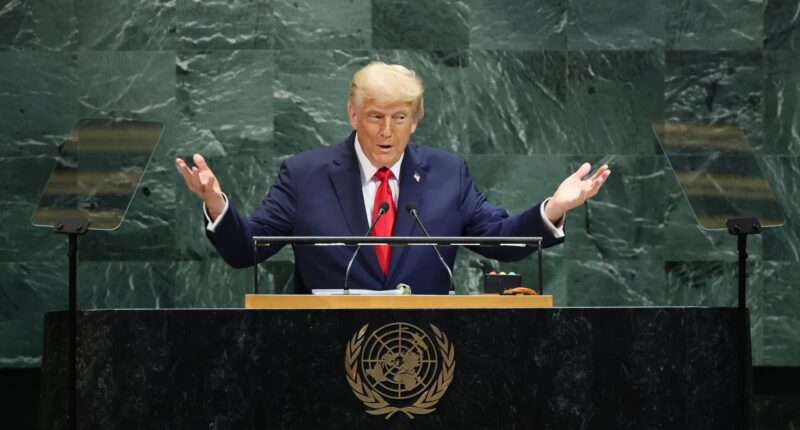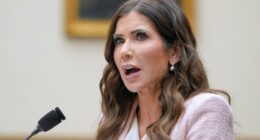Share this @internewscast.com
The emblematic COP30 symbol stands prominently against the central building backdrop in anticipation of the COP30 Brazil Amazonia 2025, scheduled for November 3, 2025, in Belem, Brazil.
Photo by Wagner Meier | Courtesy of Getty Images News | Getty Images
On Monday, Brazil will host pivotal U.N. climate negotiations, drawing representatives from nearly every nation to the edge of the Amazon rainforest. This gathering aims to forge strategies to combat the escalating climate emergency.
However, the U.S. will be conspicuously absent under President Donald Trump’s leadership. The administration has announced it will not send any senior figures to participate, marking a first for such a significant U.N. gathering.
Anticipating a turnout of approximately 50,000 participants, the 30th U.N. climate summit, or COP30, is scheduled to continue until November 21.
Anna Aberg, a research fellow at Chatham House’s Environment and Society Centre in London, suggests the absence of the Trump administration could be advantageous for global cooperation at the Belem summit.
“It’s, of course, really unfortunate that the Trump administration has withdrawn the U.S. from the Paris Agreement for a second time … and that they are pursuing this very forceful anti-climate agenda both in the U.S., and increasingly also overseas,” Aberg told CNBC by telephone.
“In light of this, I think it is just as well that they’re not sending any senior officials to COP to be honest because I don’t know what they would have been able to contribute given the way Trump is talking about climate change.”

Trump’s views on the climate crisis are well known.
The U.S. president has repeatedly described global heating as a “hoax” and speaking at the U.N. General Assembly in late September, said that climate change was the “greatest con job ever perpetrated on the world.”
Trump also urged other countries to shift away from renewable energy. “If you don’t get away from the green energy scam, your country is going to fail,” Trump said on Sept. 23.
Chinese President Xi Jinping and Indian Prime Minister Narendra Modi are among some of the other heads of state expected to skip the talks, although both countries are set to send delegations in their place.
What’s on the table at COP30?
The annual U.N. climate summit is seen as a prime opportunity for the international community to move from setting decarbonization targets to delivering on them.
Some of the core issues set to be discussed include a push to deliver on national climate commitments (NDCs), a transformation of the global financial system, ramping up adaptation measures and taking steps to protect nature.
The conference comes at a time when the impacts of climate change have become increasingly clear — even as the issue has slipped down the immediate geopolitical agenda.
Speaking to world leaders as they prepare to convene for COP30, U.N. Secretary General António Guterres called for urgent action to drive down global temperatures and keep the 1.5 degrees Celsius target within reach.
“Every fraction of a degree means more hunger, displacement, and loss – especially for those least responsible. It could push ecosystems past irreversible tipping points, expose billions to unlivable conditions, and amplify threats to peace and security,” Guterres said on Thursday in Belém.
Failure to limit global heating would amount to “moral failure and deadly negligence,” he added.
One of the most important issues at stake at COP30, Chatham House’s Aberg said, was for the international community to deliver a shot in the arm for global efforts to tackle the climate crisis.
“We’re in this really tricky geopolitical environment, not least given the U.S. withdrawal, and there are lots of things that this COP needs to achieve,” Aberg said.
Brazil’s President Luiz Inacio Lula da Silva attends the General Plenary of Leaders in the framework of the COP30 UN Climate Change Conference in Belem, Para State, Brazil, on November 6, 2025.
Pablo Porciuncula | Afp | Getty Images
“But I actually think that the most important thing it can do is to send a signal to the rest of the world that there are still governments and businesses and institutions that want to take action on climate change and are already taking action on climate change.”
Like many others, Aberg said that while the U.N. talks will be “really important” in shaping the discussion on how to tackle the climate crisis, the outcome was highly likely to be underwhelming.
What do business leaders want to happen?
Business leaders called on policymakers to provide further incentives to help accelerate climate action.
Anders Danielsson, CEO of Skanska, for example, said the Swedish construction company is confident it can deliver on its own climate targets, while acknowledging that “we cannot do it on our own.”
Speaking to CNBC’s “Europe Early Edition” on Thursday, Danielsson said: “We need political willingness to drive this forward.”
People watch as the sun rises over Ben Buckler Point in Bondi on November 27, 2024 in Sydney, Australia.
Brook Mitchell | Getty Images News | Getty Images
Tobias Meyer, CEO of logistics giant DHL Group, said that he “strongly” believed a global price on carbon would be the best incentive to help curb rising greenhouse gas emissions.
“I think we need to get the job done,” Meyer told CNBC on Thursday. “We need a price [on] CO2 emissions that needs to be done globally. That’s the best tool. Strongly believe in that, and then business needs to react to those price signals and use the technology that is available to drive down emissions.”
Meanwhile, Henrik Andersen, CEO of Danish wind turbine firm Vestas, urged renewable industry leaders to make sure they continue to make themselves heard in the shift toward low-carbon technologies.
“It’s not only about COP,” Andersen told CNBC’s “Squawk Box Europe” on Wednesday. “When COP becomes a theoretical exercise to calculate what it means to keep 1.5 degrees increase [alive] and it’s no longer possible, then probably reinvent yourself is my best advice,” he added.
— CNBC’s Emilia Hardie contributed to this report.







